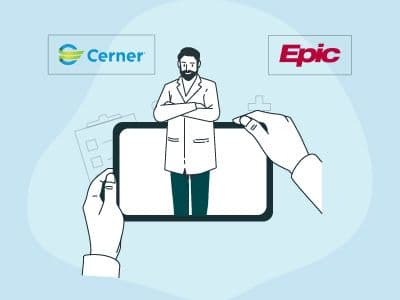Select up to 2 products
Compare Features
Feature List | Doxy.me | AdvancedMD | athenaOne | Cerner EMR | DrChrono EHR |
|---|---|---|---|---|---|
Appointment Management/Scheduling | |||||
e-Prescriptions | |||||
Lab Integration | |||||
Patient Portal | |||||
Mobile App | |||||
Telemedicine | |||||
Billing and Invoicing | |||||
Claims Management | |||||
Customizable Forms | |||||
Patient Demographics |
Make decisions with real reviews from real users
As the healthcare landscape continues to evolve, the demand for efficient and secure electronic medical record (EMR) solutions is growing rapidly. Optimizing care quality has become an integral task for practices of all sizes, which is why they are turning to medical management platforms to streamline patient engagement, reduce overhead, and enhance care coordination.
Doxy.me primarily serves small to mid-sized practices and mental health professionals who value simplification of practice operations. It is majorly known for its video conferencing functionality, making consultations convenient for both clinicians and patients. However, as telehealth needs to grow more complex, some providers are finding Doxy.me’s feature set to be somewhat limited. Common concerns include the lack of advanced features in basic plans, limited options for meetings, and occasional connectivity issues.
This guide covers the top 10 alternatives to Doxy.me, offering solutions tailored to diverse clinical and operational needs. We have outlined the key features, pros, cons, and pricing details of every platform to help you make an informed decision.
Let’s get started!
Our Best Doxy.me Alternatives For Your Practice
Software Name | Unique Advantage | Notable Features |
NextGen Office EHR | All-in-one EHR plus Telehealth platform |
|
athenaOne | Integrated revenue cycle management |
|
AdvancedMD EHR | End-to-end practice management capabilities |
|
eClinicalWorks | Highly customizable for various specialties |
|
Epic EMR | Enterprise-grade EHR and telehealth capabilities |
|
DrChrono EHR | IOS-compatible telehealth and EHR system |
|
Cerner EMR | Scalable for large healthcare organizations |
|
Allscripts EMR | Robust data exchange and interoperability |
|
ModMed EMR | Specialty-specific automation |
|
Amazing Charts | Ideal for independent practices |
|
1.NextGen Office EHR
NextGen Office EHR is a cloud-based electronic health record (EHR) and practice management system designed specifically for small to mid-sized practices across various specialties. It combines multiple functionalities such as EHR, billing, and patient engagement tools into one unified platform. It’s particularly praised for its customizability, along with robust lab integrations and patient self-scheduling tools.
Unlike Doxy.me, which is focused solely on video calls, NextGen Office delivers a comprehensive telehealth suite. This allows providers to conduct secure virtual visits, document encounters, and access clinical decision support tools from a single dashboard.
Key Features
- AI Power Ambient Assist
- Digital Patient Form
- Virtual Visits
- Remote Patient Monitoring
What Are The Pros And Cons Of NextGen Office EHR?
Pros | Cons |
|
|
How Much Does NextGen Office EHR Cost?
It offers customized pricing plans starting at $300/month for basic plans.
Disclaimer: The pricing was sourced from a third-party website and is subject to change.
2. athenaOne
athenaOne is a cloud-based medical management platform developed by athenahealth, offering an extensive suite of EHR, medical billing, and patient engagement solutions. It is considered valuable for healthcare practices of all sizes. Additionally, it also features voice-enabled documentation, empowering physicians to capture notes hands-free and improve charting efficiency.
One of athenaOne’s biggest strengths compared to Doxy.me is its fully integrated revenue cycle management (RCM). While Doxy.me may lack effective billing functionality, athenaOne provides comprehensive support through its smart coding by certified coders.
Key Features
- Voice-Driven Workflows
- Care Gap Insights
- Denial Management
- Patient Payment Options
What Are The Pros And Cons Of athenaOne?
Pros | Cons |
|
|
How Much Does athenaOne Cost?
The vendor offers a pricing model based on the practice collections.
3. AdvancedMD EHR
AdvancedMD is an all-in-one solution that helps medium- to large-sized practices enhance their overall operational efficiency. It provides a comprehensive set of features that include EHR, practice management, medical billing, and telemedicine functionalities. Many healthcare providers particularly value customizable dashboards and advanced scheduling options as they add to a more personalized experience.
Compared to Doxy.me, AdvancedMD stands out with its end-to-end operational coverage. It streamlines appointment booking, insurance workflows, and clinical documentation, areas where Doxy.me may fall short. Hence bridging the gap between administrative and clinical operations.
Key Features
- Billing Tools
- Patient Relationship Management
- Flexible Scheduling
- Revenue Cycle Management
What Are The Pros And Cons Of AdvancedMD EHR?
Pros | Cons |
|
|
How Much Does AdvancedMD EHR Cost?
It provides variable pricing options based on the requirements of medical care providers.
4. eClinicalWorks
eClinicalWorks is one of the leading ambulatory EHR tools used by over 180,000 physicians. Known for its flexibility and customization, it supports a broad range of specialties and offers tools such as TeleVisits, patient portals, and chronic care management. The system also includes population health management features and real-time data access during virtual visits, enabling practices to track and improve care outcomes.
Where Doxy.me offers basic telehealth functionality, eClinicalWorks offers extensive customization and specialty adaptation. Practices can tailor forms, workflows, and templates based on their practice’s unique needs. As a result, making it one of the superior choices for providers who want complete control over how their digital care is delivered.
Key Features
- Image AI
- Care Management
- healow Apps
- Health Information Exchange Integrations
What Are The Pros And Cons Of eClinicalWorks?
Pros | Cons |
|
|
How Much Does eClinicalWorks Cost?
It offers three pricing plans:
- EHR Only: $449/month/provider
- EHR with Practice Management: $599/month/provider
- RCM as a Service: 2.9% of practice collections
Disclaimer: The pricing is subject to change.
5. Epic EMR
Epic EMR is one of the most widely adopted electronic medical record (EMR) systems, serving large hospitals, academic institutions, and integrated health systems. Known for its comprehensive feature set, it enables the practice to administer everything from outpatient encounters to complex inpatient workflows. Moreover, the MyChart patient portal allows patients to schedule appointments, view test results, and join virtual visits from their mobile devices.
While Doxy.me is limited to video consultations, Epic seamlessly integrates telehealth within an EHR, enabling multi-department coordination, surgical documentation, and inpatient monitoring. This makes Epic a better fit for health systems seeking enterprise interoperability and regulatory compliance.
Key Features
- Online Appointment Check-Ins
- Inpatient Care Tools
- Electronic Patient Referrals
- AI Assistant For Notes Summarization
What Are The Pros And Cons Of Epic EMR?
Pros | Cons |
|
|
How Much Does Epic EMR Cost?
The vendor offers customized pricing plans based on the healthcare center’s unique needs.
6. DrChrono EHR
DrChrono is a cloud-based practice management software designed with mobility and simplicity in mind. What sets it apart is its iPad-native design, allowing healthcare professionals to note visits, access records, and manage patient information directly from an Apple device. It's particularly popular among small to medium-sized practices and solo providers who value portability and speed.
In comparison to Doxy.me, DrChrono delivers specialty-specific charting, configurable templates, and custom macros that speed up documentation. These personalized workflows help clinicians operate more efficiently and provide care in a way that aligns with their practice style, a major gap in Doxy.me’s standardized interface.
Key Features
- Specialty-Specific Templates
- Customizable Clinical Notes
- Video Visits
- HIPPA Compliance
What Are The Pros And Cons Of DrChrono EHR?
Pros | Cons |
|
|
How Much Does DrChrono EHR Cost?
It offers the following pricing plans at customized rates:
- Prometheus (EHR & Practice Management)
- Hippocrates (Advanced EHR & Practice Management)
- Apollo (EHR, Practice Management & Medical Billing Software)
- Apollo Plus (EHR, Practice Management & Revenue Cycle Management Services)
7. Cerner EMR
Cerner EMR (now part of Oracle Health) is a robust EHR platform developed for large-scale hospitals and health networks. It offers a wide range of capabilities, including clinical documentation, lab integration, telehealth, and analytics. It is widely recognized for its clinical decision support tools, helping clinicians make evidence-based choices by integrating guidelines and alerts into the care process.
Cerner goes beyond video visits by offering tools like continuous remote patient monitoring, which tracks health data from wearables or devices and feeds it directly into the patient chart. This type of longitudinal care and real-time monitoring is crucial for managing chronic conditions, which Doxy.me doesn’t support.
Key Features
- Care Coordination Tools
- Population Health Management
- Reporting And Analytics
- Data Security
What Are The Pros And Cons Of Cerner EMR?
Pros | Cons |
|
|
How Much Does Cerner EMR Cost?
It offers module-based pricing plans tailored to the needs of medical care providers.
8. Allscripts EMR
Allscripts EMR, now Veradigm, offers a suite of solutions tailored for both ambulatory and acute care practices. One of its key offerings is the FollowMyHealth patient portal, which improves patient communication by giving users access to their records, lab results, and telehealth sessions in one place. Moreover, it also supports precision medicine initiatives, enabling providers to make data-driven clinical decisions through predictive analytics and patient population insights.
In comparison to Doxy.me’s limited integration capabilities, Allscripts is designed with robust interoperability. It allows practices to connect with hospitals, imaging centers, and labs through open APIs and HL7 standards. This enables practitioners to focus more on the care of their patients.
Key Features
- Predictive Analytics
- Claim Verification Tools
- Patient Follow Up System
- e-Prescribe Options
What Are The Pros And Cons Of Allscripts EMR?
Pros | Cons |
|
|
How Much Does Allscripts EMR Cost?
The vendor provides varied pricing plans as per the specialty needs.
9. ModMed EMR
ModMed EMR, developed by Modernizing Medicine, is a modern specialty-specific EHR designed with a focus on dermatology, ophthalmology, orthopedics, and ENT practices. Its hallmark feature is its Electronic Medical Assistant (EMA), which helps streamline documentation. The platform also supports mobile image capture, allowing physicians to visualize findings directly into the chart using mobile devices.
Where Doxy.me offers a generic telehealth interface, ModMed EMR offers tools that enable providers to build treatment plans as per patients’ conditions. This not only helps improve clinical efficiency but also significantly reduces charting time.
Key Features
- ModMed Scribe
- Clinical Workflow Management
- Patient Portal
- Lab Integrations
What Are The Pros And Cons Of ModMed EMR?
Pros | Cons |
|
|
How Much Does ModMed EMR Cost?
It offers customized pricing plans based on the specialties offered by the practices.
10. Amazing Charts
Amazing Charts is an EHR tool developed by clinicians for independent and small practices. It focuses on simplicity, usability, and compliance, featuring tools like SOAP note templates, one-click ePrescribing, and secure messaging. Moreover, it offers telehealth capabilities, supporting remote care without overwhelming users with complex features.
What sets Amazing Charts apart from Doxy.me is its focus on clinical autonomy for solo providers. While Doxy.me offers only a standardized telehealth experience, Amazing Charts gives practitioners the ability to fully control their care delivery process.
Key Features
- Patient Tracking
- Diagnosis Management
- Video Visits
- Chronic Care Management
What Are The Pros And Cons Of Amazing Charts?
Pros | Cons |
|
|
How Much Does Amazing Charts Cost?
It offers the following plans:
- Electronic Health Records (EHR) - Hosted: $229/month
- Electronic Health Records (EHR) - Locally Installed: $249/month
- Bundled EHR + Practice Management: $499/month
Disclaimer: The pricing is subject to change.
How We Selected Our Doxy.me Alternatives?
Here’s how we chose the top 10 Doxy.me alternatives:
- Real-Time User Reviews: We analyzed verified user feedback to understand real-world performance and user satisfaction
- Functionality Beyond Video Conferencing: Each alternative listed offers tools more than just video calls, such as EHR integration, billing tools, custom workflows, or patient engagement
- Practice Versatility and Scalability: We included tools that serve different practice sizes, from solo practitioners to enterprise-grade systems, to ensure a wide range of choices
- Compliance and Security Standards: Only platforms that support HIPAA compliance and robust security protocols made the list, ensuring safe data handling in virtual care settings
Finding The Ideal Doxy.me Alternative
Finding the right alternative to Doxy.me depends heavily on your practice size, clinical needs, and technology readiness. Whether you’re a solo practitioner looking for basic EHR integration or a large multispecialty clinic seeking enterprise-grade tools, the right telehealth solution should enhance your workflow.
Now is the time to evaluate your current system and take the next step toward smarter telehealth. Ready to upgrade your telehealth platform? Contact us today to compare top Doxy.me alternatives and find the ideal solution for your practice.





